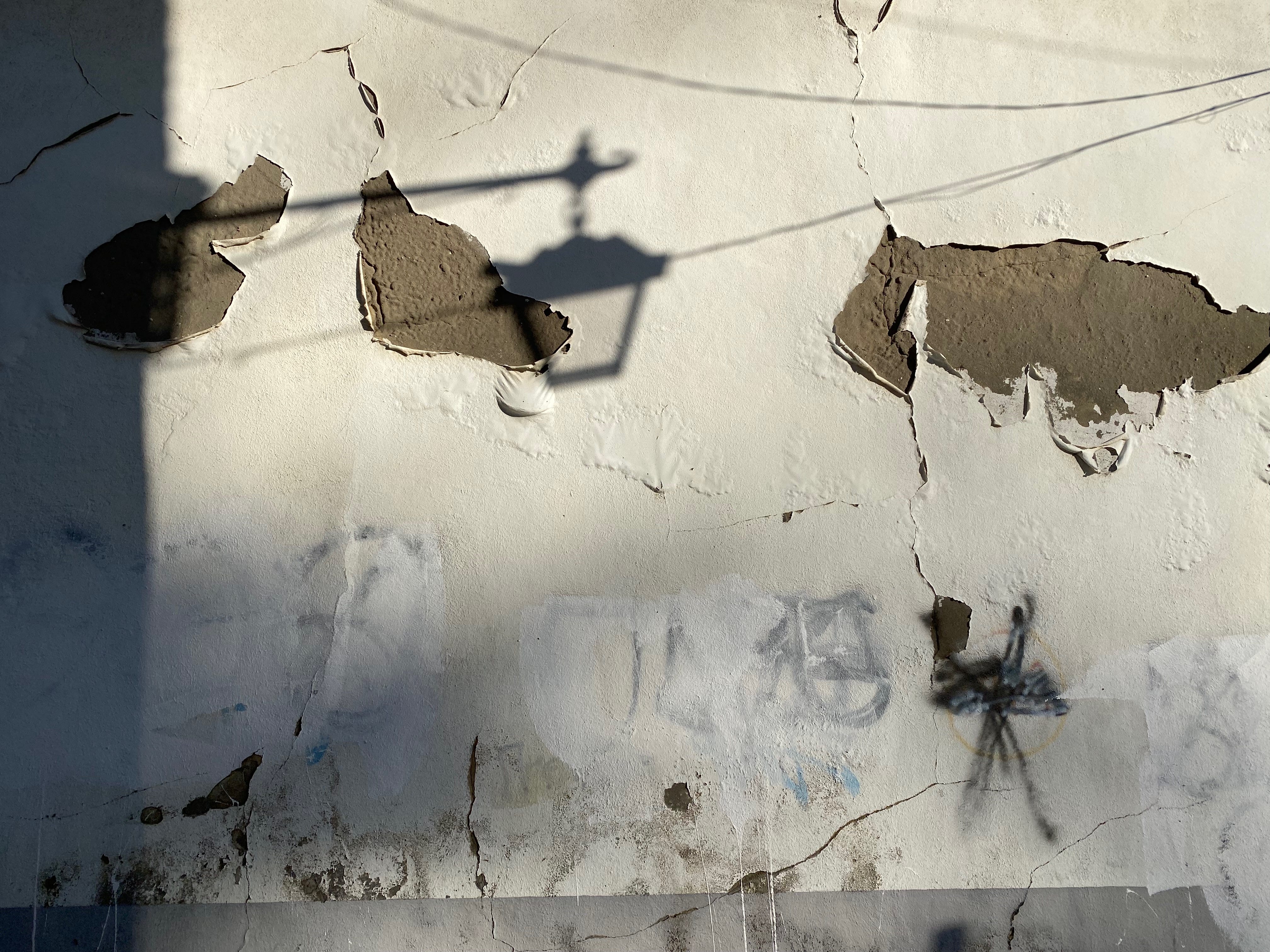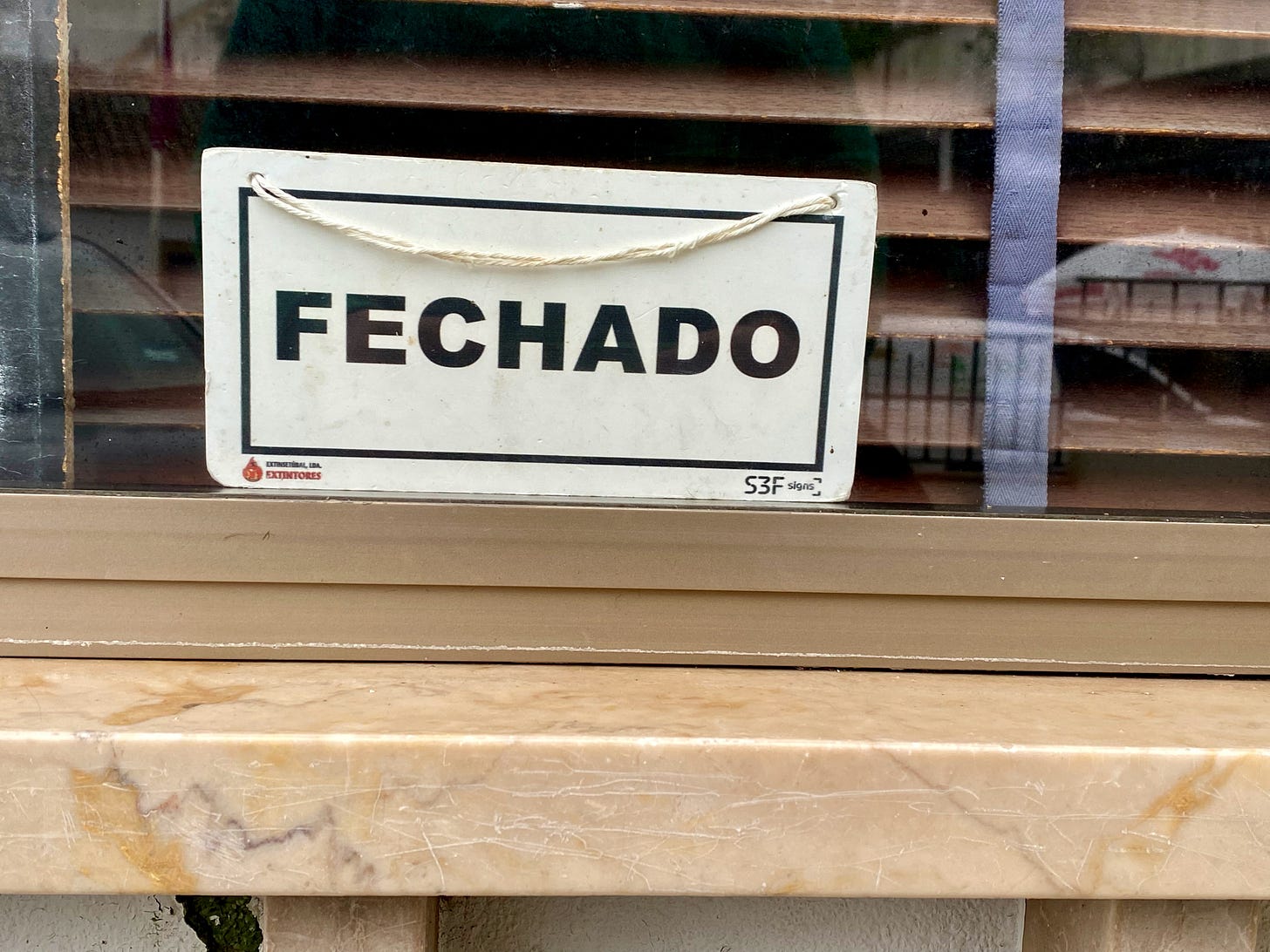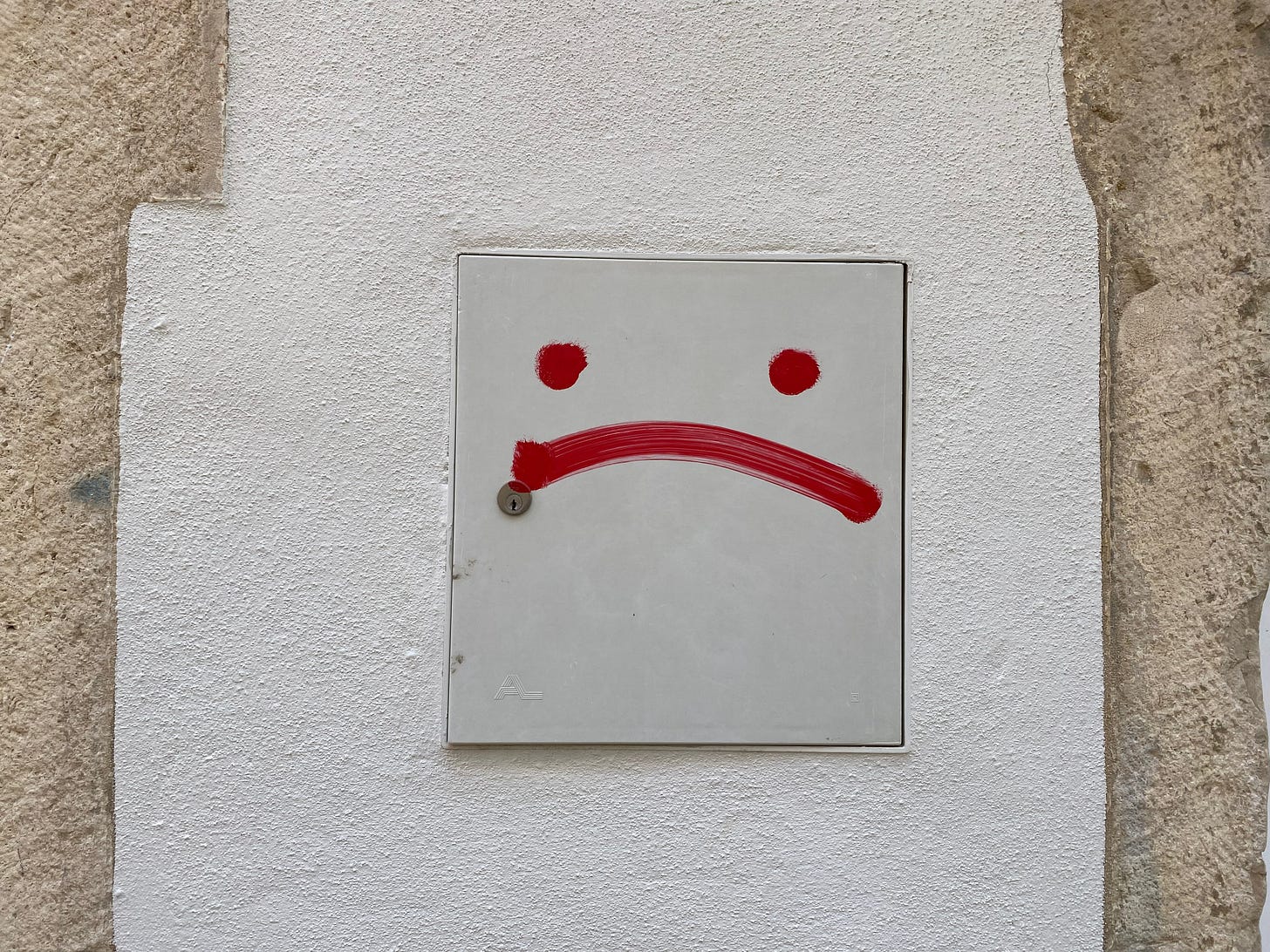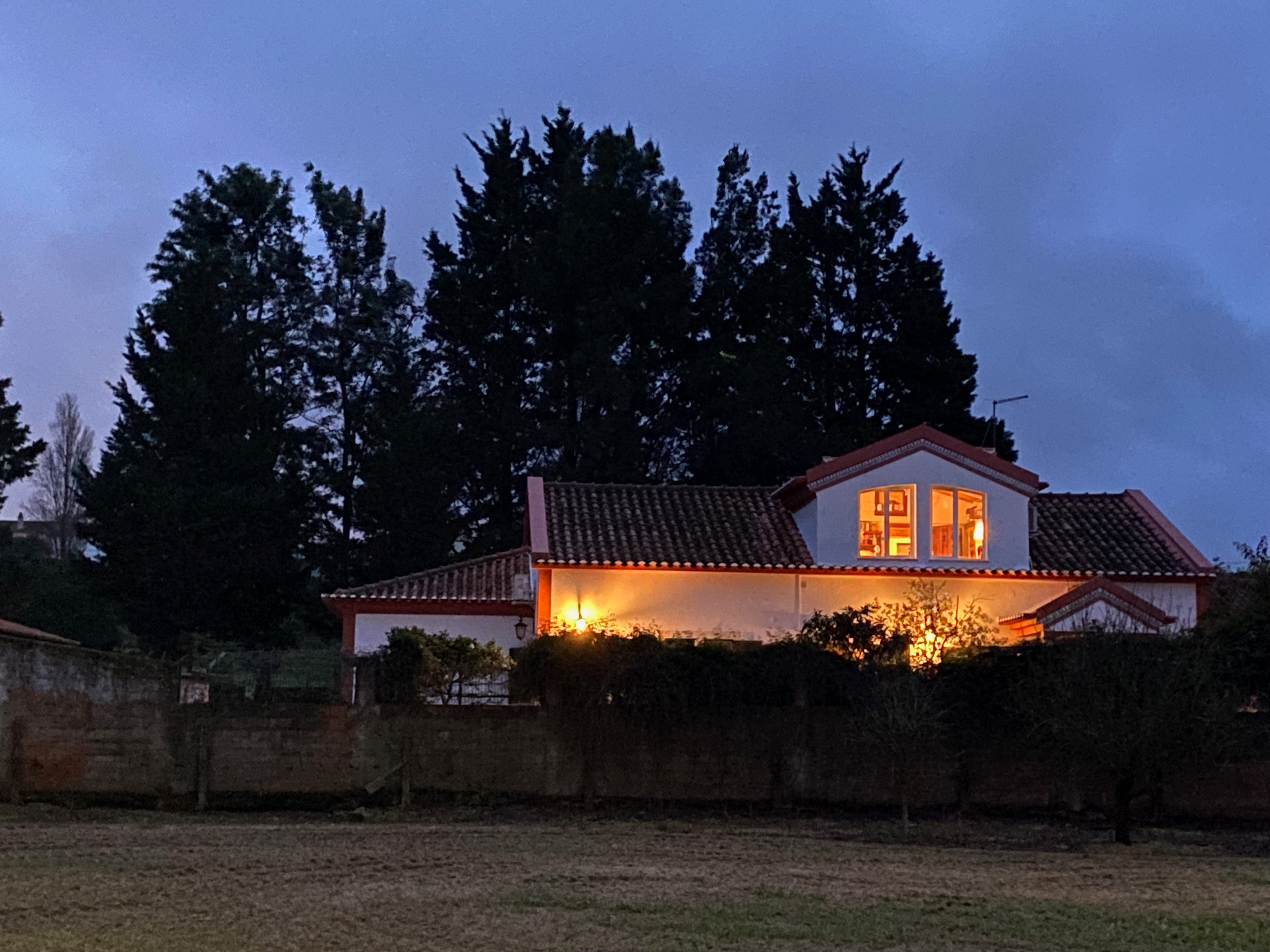When the power went out, I was downloading an app that would scan my reading glasses and tell me what my prescription is. I haven’t gotten my eyes checked in four years, since right before we left the US for Portugal. I’m in the market and mood for fresh lenses.
When the power went out, I thought it was just our internet router. It happens sometimes. On my way to check the router, I flicked a light switch on a whim. Nothing happened. Huh, I thought, power’s out. There was no urgency to this realization. Often the power goes out here when you run the dishwasher, the dryer, and the toaster oven all at once.
I made my way outside to the small cement room that houses all the electric knobs and levers. I opened the metal box, stabbed my finger at the big button that resets everything.
Nothing.
Huh, I thought, maybe the power is out in the whole neighborhood?
Still feeling zero sense of urgency (Portugal has rubbed off on me), I texted our nearest neighbor, Arthur. Hey, I said, is your power out?
From the upstairs window of my writing room, I could see Arthur sitting in his lawn chair in front of his workshop, soaking up the mid-morning sun. I saw him shift his phone in his hands, check my message. He got up, walked back into his workshop, flipped a few switches. A couple of seconds later, his response lit up my phone: Yes, no power. I did not notice until you asked.
Okay, I told myself, okay, no big deal. It’s probably better that the neighborhood is out. Maybe the electric company will respond more quickly. I texted Marido, five countries away in Poland, and told him what was happening. He pulled up the E-Redes site on his phone, reported the outage. Thanks, I told him. I’m sure it’ll get fixed soon.
An hour later, still no lights. I texted my Portuguese teacher, Marina. We had a class scheduled for the afternoon. I told her I might not make it. Não há eletricidade. Não há internet. She replied immediately: Igual aqui. Same here. And, she said, it’s the whole country. Todo a país, e também Esphanha.
I felt the first real shiver of unease then. All of Portugal, and Spain too? The entire Iberian peninsula, without power? Was such a thing even possible?
If you paid attention to the news at all yesterday you know that it’s possible, that it happened. All of Portugal, Spain, slivers of France and Italy went dark. I mean, it was 11:30am so it wasn’t literally dark-dark unless you were on one of elevators or metro cars that got stuck between floors or underground.
Traffic signals went dark, airplanes were grounded, petrol stations were closed. Outside some buildings, burglar alarms blared for hours. Darkened grocery stores saw a crush of customers, most seeking large jugs of water, battery-powered flashlights, and non-perishables.
At home, Mirtilo and I were without water as well as power—our quinta has its own well that runs on an electric pump.
For a couple of hours, in spite of the massive scale of the outage, the situation seemed manageable. I was texting Marido with updates; Mirtilo was texting with friends from school who shared wild rumors—a plane had crashed into a power generator; Russian hackers had launched a cyber attack.
Then all cell service disappeared. I’m talking Gone. Like not even a hint of a bar, just a blank where connection should be.
I couldn’t send or receive, couldn’t call or communicate. I had no idea what was going on. As the hours crawled by I got more and more spooked, but I didn’t want to freak Mirtilo out. I kept my cool.
We strategized about what food to take out of the fridge, then opened to door and pulled it out in one quick dash. We cooked dinner on our propane stovetop. I lit the burners with a match.
Mirtilo was chatty as we ate, but I asked them if they’d be ok if we read books during dinner. I was afraid my anxiety was starting to show, cracks in my hey-this-is-no-big-deal-actually-it’s-sort-of-fun façade. So we sat companionably at the table and ate and read and slowly the sky outside began to fade.
It had been a warm day and the air outside was still balmy, so we rinsed ourselves off in the hot tub. Or, as Mirtilo called it at that point in the outage, the lukewarm tub. I had dug out our camping lantern, the one that runs off of a big battery, and we sat it in the living room windowsill to light up the couch where we curled in our pajamas and continued to read until we were yawning too much to continue.
In the bathroom I poured us big glasses of water from the emergency seven-liter jug we keep on hand. We used them to wash our hands, brush our teeth. We plugged our devices into the portable batteries we usually reserve for traveling. Then there was nothing left to do but go to bed.
Do you think the power will come back in the middle of the night? Mirtilo asked as I tucked them in.
It’s possible, I said in a voice I hoped was cheery. I’m sure there are lots of people working right now to make the lights come back on.
One of my classmates said it could take three days for them to fix it, Mirtilo said quietly. Do you think it will take three days?
I don’t know, baby, I said, smoothing their long, thick hair. But I’m sure it will be soon.
I wasn’t sure, though. Wasn’t sure of anything.
I flipped on a light switch in the living room, or at least I thought I’d flipped it on. It was impossible to tell which click meant ON and which meant OFF. If the power returned in the small dark hours, though, I wanted to know.
When I closed my bedroom door the silence was profound. No background whisper of air, no ambient electronic hum of the thousand kinds we are accustomed to, so necessary to our daily routines that we don’t even notice their low vibration. How many times yesterday did my hand involuntarily twitch toward a light switch before my brain could say: Don’t bother! It’s no use.
I thought I’d never be able to fall asleep. I lay there imagining the hollowed-out airports, the stranded people, Marido 3,000 kilometers away with no way of knowing how we were doing. We’re okay, I thought eastward in his general direction, but we wish you were here!
Next thing I knew it was morning.
Actually, that’s not true. I did a great deal of tossing and turning in those in-between hours but I don’t need to recount every little thing I catastrophized about. I’ve no doubt you know how it is when your mind is unsettled and your body can’t fully shut down.
Morning did come, though, and with it the restoration of cell service. Two gorgeous little bars of connection potential in the upper right corner of my phone screen. We were linked to the wider world once more.
The lights were still dark though, no power anywhere on our property. But Mirtilo’s school was lit up, so I dropped them off before hurrying back home to check the panel in the electric house for any blinking sign of life: Nothing.
I could see that others were back on the grid, though. On Facebook groups, fellow Westerners in nearby Setúbal were recounting their sort-of-romantic dinners-by-candelight and then saying: But the lights came on at 11pm, so really the power outage was no big deal.
Meanwhile, our faucets were dry and the refrigerator was beginning to smell suspicious.
What if this lasts for days? I thought, home alone with no one to modulate my tone for. What if I have to throw out all the food in the fridge? What if Marido can’t get back here anytime soon? What if we run out of drinkable water? What if I can’t take a shower for two more days?
It’s all so fragile, isn’t it? This modern world we’ve built our lives upon like it’s some sort of bedrock. Like it cannot be shifted.
Except that it can. So much more easily than we want to admit to ourselves in the bright light of day.
I remember this feeling from March 2020, this sudden and certain realization that the society—the structures and systems which for the entirety of my life I thought of as immutable—were not.
Pull a card here, tilt a table there, add a dash of global pandemic and suddenly you can see right through the foundation. As if it’s made of glass, an illusion.
The intervening years have only solidified my suspicion that all of these things we count on to bear our weight cannot, in fact, bear up.
The rule of law exists only when people are law-abiding. These institutions we’ve venerated, they only work when all parties plug in.
As I weathered my 24 hours (yes, that was the limit—lights, water, internet came back at 11:30 this morning) without the fundamental niceties that keep our Western world moving, my mind turned again and again to Gaza. To the people whose have endured all manner of horror—death in the cruelest of forms—in addition to the lack of power and water for the last 19 months.
Last night I was complaining about how sticky my hands felt after dinner. How subpar a hand-washing is without running water. Today I’ve already scrubbed my hands four or five times since the power returned, just for the luxury of feeling clean.
Imagining a world in which you can’t adequately wash yourself or your children, where you’ve been forced to exchange walls for a tent in the sand and still the bombs fall, incinerating everything and everyone you love—the atrocity of it feels unimaginable and yet it’s happening right now to a woman just like me. It’s happening right now, over and over again.
The news reports can’t ascertain a clear cause for the power outage that swept through southern Europe yesterday. “A rare atmospheric phenomenon; induced atmospheric vibrations” is what Redes Energeticas Nacionais (REN) blames for “a severe imbalance in temperatures that led to the widespread shutdowns.” source
When my friend Michelle heard that, she texted to say it sounded like solar flares. Which for no scientific reason at all made me think of climate change, which kept me up at three a.m. imagining all the ways in which it will keep getting worse. Imagining the day arriving when nobody can fix it. The day when the lights don’t come back on.
How will we find each other then?
How did we find each other before all of this power?
Because we did, didn’t we? Before all of this cyber connection, all of these circuit boards lit up with dopamine hits? Humans existed long before the internet, the cell phone, the light bulb.
Were we better then, did we care more for each other?
History says no.
But maybe if there’s an electric regression in our future, we can learn how to move forward together? Build a better sort of existence for everyone? Recognize the concept of interconnectivity not as a switch to flip but as a way to see the world. A way to see each other.
Maybe you’re thinking, Holy geez, LaDonna! This last part’s gotten a bit dark.
Yes, well. These are the thoughts I think when all the lights go out.
If you want to support my work…
You can choose from a couple of tiers of paid subscriptions. In addition to my undying gratitude for your support, you’ll get more of my writing, which is what (I assume) you’re here for! Once a month for paid subscribers only, I will post an excerpt from my memoir-in-progress. The first one is here, for free, if you want a preview.
OR
If you’re not into paid subscriptions, but you’d still like to show support every once in a while, you can leave me a tip via Venmo or Tipeee.
OR
If you want to carry on reading these posts for free because you can’t or shan’t pay, that’s perfectly fine. I do not hide Long Scrawl essays behind a paywall.
NO MATTER WHAT: Thank you for reading. Thank you for telling me when my writing means something to you. That matters most of all.
Copyright © 2025 LaDonna Witmer • {all photos by author}








You speak for me. On the central coast where I am, power came back around 11 pm last night. The space of not knowing what was happening for several hours was profoundly rich. Indeed, it was here that I felt in the body the connection to Gaza and to millions that live like this everyday. Deeply appreciate your 'bit dark' part. Indeed, it is from the deepest darkness that perhaps, as a species, we will finally learn to embody our shared humanity.
thanks for sharing your "powerless" story ('m finishing mine and posting tonight) - it really resonated with me. I have been through this in the US but if felt different here, in a place I think of as home but also where I still feel like a foreigner, though less and less. here's to being connected!